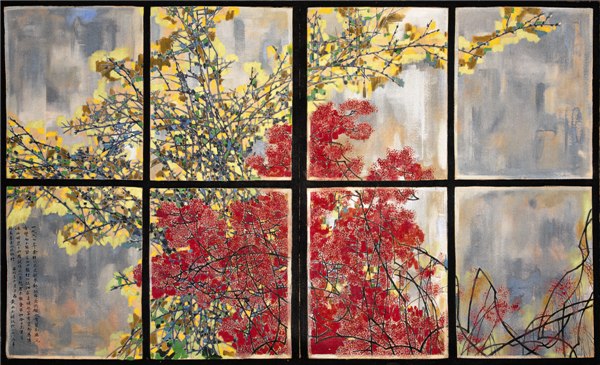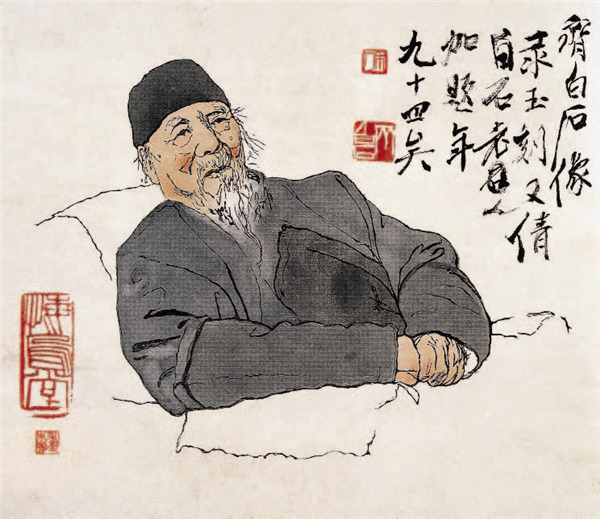

Oil painting, 1967, by Huang Yongyu. Photo provided to China Daily

A work by Huang Yongyu. Photo provided to China Daily
Huang associates the warmth and enthusiasm of his art with his early years in his hometown and his later experiences as a vagrant during chaotic times.
"Confucius said that 'I lived a humble life in childhood, thus I've acquired a lot of skills'. I'm also much more familiar with the lives of the underprivileged. I totally understand what they think and say. I paint, write and make things that most viewers feel attached to," Huang says.
He says the power of his works comes from his bravery and his positive attitude toward life.
"I'm doing my best to live a normal and peaceful life, even when it does not always go that smoothly. I solve life problems by painting, and when painting is not expressive enough, I turn to sculpture and furthermore, to writing."
Humor is another keynote that has made his artistic charm appreciated by more people.
He jokes that he was born not a serious man. "I'm not someone who will ponder over majestic questions such as the meaning of life as soon as he wakes up. The moment I get out of bed, I only think about how to write and paint.
"One can't enjoy life if he spends all day long thinking about the meaning of everything."
National Museum of China's director Lyu Zhangshen comments that Huang not only incorporates the mainstream of Chinese and Western cultures in his hierarchy of knowledge; he also expresses folk wisdom in his diversified creations.
Huang says he lives the day lying on the ground and smelling the odor of mud. "The benefit of being down-to-earth is one will not feel the pain of falling down off the peak."
Guang Jun, professor with the Central Academy of Fine Arts, says Huang has achieved so much because he has a good appetite for art and a heart of tolerance.
"He (Huang) puts the world on one end of a balancing board and himself on the other end. He has equipped himself with special wings, and is making great efforts to perfect his art. Little by little, he gains more weight and counters the world," Guang says.
Guang sees Huang as "an old buddy" as well as a role model:
"I may feel quite contented to play teeter board with him, but I can never lift up his side."
Huang is working on the second half of his autobiography, which will recollect his experiences in wartime. He says the book's third installment will be about the twists and turns of his life from 1949 to the "cultural revolution" (1966-76).
"I'm not sure whether I can live for another 10 years and finish the other two parts. Let time decide."
If you go
Exhibition of Huang Yongyu's Art to Celebrate His 90th Birthday
9 am-5 pm, no entrance after 4 pm, closed on Mondays, until Sept 16. National Museum of China, east of Tian'anmen Square, 16 East Chang'an Avenue, Beijing.
At a glance
Huang Yongyu is hailed an art genius among the artists of his time. He spent his childhood in Fenghuang, a heavenly county with landscapes and folk culture that continues to inspire his artistic creations today.
At the age of 13, he left his hometown alone for Xiamen, Fujian province, to continue junior high school education. Unable to catch up with his classmates academically, he found the school library a retreat where he read extensively and nurtured his literary skills. He also taught himself the art of woodprints.
After a conflict with local children, he dropped out of school and embarked upon a vagabond life. He supported himself by doing odd jobs and selling portraits and prints.
He became a print teacher at the Central Academy of Fine Arts in 1953. He rose to stardom creating many acclaimed woodprints. His career however came to a halt during the "cultural revolution" (1966-76). He survived those tumultuous times, and his talents in various art forms and literature were gradually recognized in the 1980s.
Fiber & Space Art Exhibition opens in Hangzhou
2013-09-023D painting exhibition kicks off in Xi'an
2013-08-29Exhibition features manga pirate boy and pals
2013-08-26Copyright ©1999-2018
Chinanews.com. All rights reserved.
Reproduction in whole or in part without permission is prohibited.